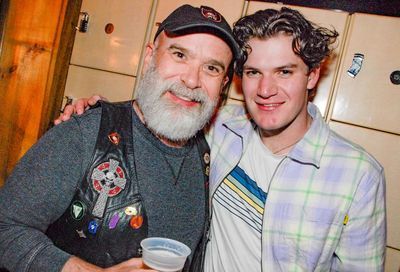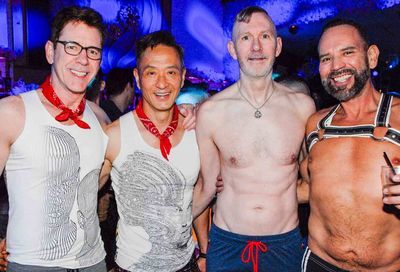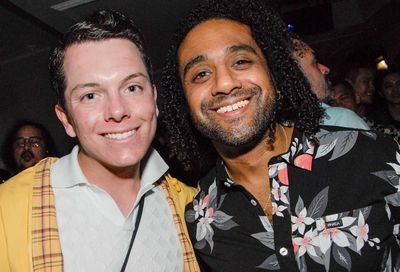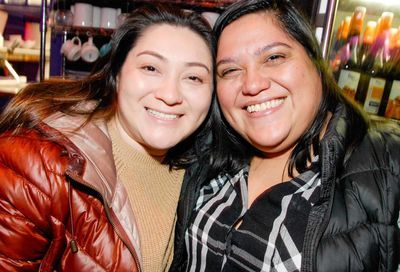Missed Connections
Alphabet Soup
News last week of the death of lesbian journalist Sarah Pettit did not come as a surprise to me, because I had heard that she was terminally ill and wasn’t doing well. It stunned me, because she was only 36 — a tragic and untimely theft of great talent. But I knew it was coming.
I had never met Pettit and wasn’t in her circle of friends or acquaintances; instead, my source for the news was my partner’s brother, who was rousing rabble at the same time as Pettit in late-’80s and early-’90s New York City.
|
I knew the name well, even if I never knew the woman. She was one of the founders of Out, a magazine launched around the same time that my career in gay journalism began. This, to me, made her The Competition. I didn’t think much about her beyond that.
I didn’t realize it then, but she was more inspiration than competition. She was, unbeknownst to me, fighting the good fight for lesbian visibility before I even knew it needed to be fought. The year that Out launched, I joined the news staff of the nation’s largest and most reputable gay newspaper — where two of the three editors above me were women, and many of us in lower editorial staff positions were women too.
I was baffled to start work there and learn almost immediately that despite the reality of the staff’s composition and the balance in the news we published, there was a somewhat rampant perception among many lesbians that the Washington Blade was a publication geared toward gay males. Among those women who were politically obsessed, like the Blade at the time, it was accepted that the coverage they were reading was gender-neutral.
But I remember one uncomfortable meeting with a prospective psychotherapist shortly after I moved to the D.C. area and started my job. She was a lesbian and immediately alienated me by asking why I worked at the Blade, such a heavily male newspaper.
I tried to explain that in the gay community, advertisers who use male imagery are much more plentiful than those who want to depict women, so when you flip through the paper, that’s why you see so many half-naked men. But she didn’t seem to care. Her mind was made up. (That same first — and only — session, she further ensured that I wouldn’t return by making off-the-cuff insulting assumptions about my father. “Geez, lady, ” I thought, “give it a session or two. “)
At that time, Sarah Pettit was 212 miles north, figuratively busting balls to make sure that Out was a magazine that lesbians wanted to pick up just as much as gay men did, and simultaneously that gay journalism as a field served lesbians too. After she was fired in 1997 (by which time I had become an editor at the Blade), leaving allegations of sex discrimination in the wake, Out radically changed direction, to the extent that I saw it as no competition to our news coverage at all.
But the plight of lesbian representation in queer community publications plagues me to this day, even during this writing. Last year I accepted a position as a regular columnist for a magazine that is so far off the radar of many lesbians that sometimes women look at me quizzically when I mention my affiliation.
The point came crashing home to me over the weekend, when I sat through a retreat for a board I just joined. The board, which advises the Lesbian Services Program at Whitman-Walker Clinic, had already outlined some steps for media outreach that included hopes of increasing coverage in a handful of local publications — and nowhere was this magazine mentioned.
I know that my bosses at Metro Weekly have the best intentions about continuing to broaden this publication’s scope and making it a place that lesbians can feel at home — possibly at the cost of some of their male readers.
It was with some trepidation that I agreed to join this roster of columnists, because of the fear that I was letting myself be tokenized. Ultimately, I have faith in progress and already see it happening here. But it was only a couple of months ago that I had to correct my own partner’s mistaken notion that the publication printing my verbal spewage every couple of weeks was not, as she put it, a “trashy gay magazine. ”
She was, I was appalled to learn, picturing a much earlier publication bearing a similar name. In any event, it drove the point home — again, again — that lesbians, even in my own back yard, don’t consider this publication one of theirs.
There’s no question that in a community with interests as vastly divergent as those of lesbians and gay men, separate space is warranted sometimes. But we share space too, and we can’t avoid that. When resources exist that attempt to serve the entire community, we should scoot over and let each other have room.
This won’t be a popular suggestion with many gay men, I’m sure. They’ll say that there are more gay men in the world than women, that this magazine is for men — just flip to the back and see for yourself!
I heard from the likes of these guys occasionally when I was an editor at the Blade. We would run a lesbian-focused story and it would set some man off, triggering vicious and often disparaging complaints about how the newspaper wasn’t covering men well enough anymore.
We heard the same gripes from women, but in those cases there was usually a tone of resignation, of exasperation. It was the voice of people who were growing tired of demanding a place at the table, whereas the men I heard from sounded threatened to be bumping elbows with someone new at a table where they’d grown so comfortable. I was once told that the readership of the Blade was more heavily male and that our coverage should reflect that — but how many lost female readers were out there because of that mindset, part of a cycle continually repeating itself?
Criticism like that tells an editor that something is being done right — the Democrats complain about a right-wing tilt to the coverage, while the Republicans can’t believe the bleeding-heart garbage they’re reading. Everybody wants to see himself, herself in the publication they call their own, and seeing something foreign can feel threatening.
Sure, there’s a point to having separate spaces. This city has at least a couple of publications that are specific to a female readership. If this magazine’s ownership decided they wanted to target men only, I’d put down my virtual pen and let them do what they want, and I’d applaud another publication with aspirations of being male-only. But the truth is, there is strength in numbers.
Our community has room for all sorts of voices — and does it really hurt us to listen to people who come from a different place from what’s comfortable to us? Does it kill us women to read what the coverboy of the week keeps in his nightstand drawer? Hell no! I get some great organizational tips from those guys. There’s a reason that we walk this earth together and share a common struggle.
In the end, we’re sometimes painfully reminded of what has been silenced. Sarah Pettit’s death is an example of a light extinguished far too soon, and it’s embarrassing to think that we had her in the world of gay journalism and let her slip away well before we needed to.
Kristina Campbell believes in a diverse queer press, and encourages use of the Letters to the Editor column to make that happen. She writes “Alphabet Soup ” biweekly and can be reached at kcampbell@metroweekly.net.
Support Metro Weekly’s Journalism
These are challenging times for news organizations. And yet it’s crucial we stay active and provide vital resources and information to both our local readers and the world. So won’t you please take a moment and consider supporting Metro Weekly with a membership? For as little as $5 a month, you can help ensure Metro Weekly magazine and MetroWeekly.com remain free, viable resources as we provide the best, most diverse, culturally-resonant LGBTQ coverage in both the D.C. region and around the world. Memberships come with exclusive perks and discounts, your own personal digital delivery of each week’s magazine (and an archive), access to our Member's Lounge when it launches this fall, and exclusive members-only items like Metro Weekly Membership Mugs and Tote Bags! Check out all our membership levels here and please join us today!





















